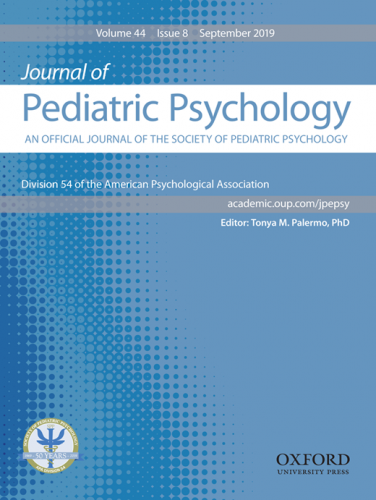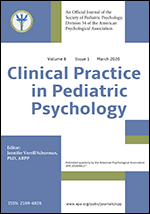Assessment Resource Sheet : Pediatric Gastroenterology
Assessment of pediatric gastroenterological conditions can be conducted via self-report, physical examination, questionnaires, and behavioral observations. Most common assessments include those of disease severity/activity, diagnostic classification, quality of life, and parental behaviors. This list is based on measures summarized previously by the Division 54 Pediatric Gastroenterology Special Interest Group (SIG) - Assessment Working Group. It contains a summary of commonly used measures across pediatric gastroenterological conditions, including inflammatory bowel disease, functional abdominal pain, encopresis and feeding disorders. All measures are classified as well-established assessment, approaching well-established assessment, and promising assessment as detailed in the Cohen, La Greca, Blount, Kazak, Holmbeck & Lemanek (2008) paper. Age ranges (when available) are included in parentheses. Central references are included and are cited with superscripts in the tables.
Inflammatory Bowel Disease
|
Assessments |
Well-established |
Approaching |
Promising |
|
Quality of Life |
|||
|
IMPACT-III1,2 (ages 9-17) |
X |
||
|
Family Functioning-Responsibility |
|||
|
Inflammatory Bowel Disease Family Responsibility Questionnaire (IBD-FRQ)3 (ages 11-18) |
X |
||
|
Disease Activity |
|||
|
Harvey-Bradshaw Index4,5 (all ages, including adults; Crohn’s disease) |
X |
||
|
Pediatric Crohn’s Disease Activity Index (PCDAI)6,7(ages 0-19) |
X |
||
|
Pediatric Ulcerative Colitis Activity Index (PUCAI)8,9 (ages 2-18) |
X |
||
|
Lichtinger Ulcerative Colitis Clinical Activity Index (LCAI)10 (all ages) |
X |
||
Functional Abdominal Pain
|
Assessments |
Well-established |
Approaching |
Promising |
|
Diagnosis/Classification |
|||
|
The Questionnaire on Pediatric Gastrointestinal Symptoms- Rome III version (QPGS-RIII), Parent Report11,12 (ages 4 -18) |
X |
||
|
Symptom Severity |
|||
|
Abdominal Pain Index (API)13,14,15 (ages 8 – 18) |
X |
||
|
Coping |
|||
|
Pain Response Inventory (PRI)13,16,17 (ages 8 – 18) |
X |
||
|
Parental Responses to Child Pain Behavior |
|||
|
Illness Behavior Encouragement Scale (IBES)18,19,20 (ages 6-16) |
X |
||
|
Adult Responses to Children’s Symptoms (ARCS)21,22 (ages 8-18) |
X |
||
|
Functional Disability/Impairment |
|||
|
Functional Disability Inventory (FDI)17,23,24 (ages 8-17)* |
X |
||
Encopresis
|
Assessments |
Well-established |
Approaching |
Promising |
|
Symptom Assessment |
|||
|
Virginia Encopresis-Constipation Apperception Test (VECAT)25 |
X |
||
|
Diagnosis/Classification |
|||
|
Profile of Toileting Issues (POTI)26,27,28 |
X |
||
Pediatric Feeding Disorders
|
Assessments |
Well-established |
Approaching Well-established |
Promising |
|
Observational Coding Systems |
|||
|
Mealtime Observation Schedule (MOS)29,30,31,32 |
X |
||
|
Dyadic Interaction Nomenclature for Eating (DINE)33,34,35,36,37,38 |
X |
||
|
Caregiver Report Inventories |
|||
|
Behavioral Pediatric Feeding Assessment Scale (BPFAS)35,39,40 |
X |
||
|
Children’s Eating Behavior Inventory (CEBI)41 |
X |
||
|
Screening Tool of Feeding Problems (STEP)42,43,44 |
X |
||
|
Brief Autism Mealtime Behavior Inventory (BAMBI)45,46 |
X |
||
|
Feeding Strategies Questionnaire (FSQ)47 |
X |
||
|
About Your Child’s Eating (AYCE)48 |
X |
||
|
Parent Mealtime Action Scale (PMAS)49,50 |
X |
||
|
Mealtime Behavior Questionnaire (MBQ)51 |
X |
||
1. Hyams J, Crandall W, Kugathasan S, et al. Induction and maintenance infliximab therapy for the treatment of moderate-to-severe Crohn's disease in children. Gastroenterology. 2007;132(3):863-873.
2. Otley A, Smith C, Nicholas D, et al. The IMPACT questionnaire: a valid measure of health-related quality of life in pediatric inflammatory bowel disease. J Pediatr Gastroenterol Nutr. 2002;35(4):557-563.
3. Greenley RN, Doughty A, Stephens M, Kugathasan S. Brief report: development of the inflammatory bowel disease family responsibility questionnaire. J Pediatr Psychol. 2010;35(2):183-187.
4. Harvey RF, Bradshaw JM. A simple index of crohn's disease activity. Lancet. 1980;1:514.
5. Markowitz J, Grancher K, Kohn N, Lesser M, Daum F. A multicenter trial of 6-mercaptopurine and prednisone in children with newly diagnosed Crohn's disease. Gastroenterology. 2000;119(4):895-902.
6. Hyams JS, Ferry GD, Mandel FS, et al. Development and validation of a pediatric Crohn's disease activity index. J Pediatr Gastroenterol Nutr. 1991;12(4):439-447.
7. Shepanski MA, Markowitz JE, Mamula P, Hurd LB, Baldassano RN. Is an abbreviated Pediatric Crohn's Disease Activity Index better than the original? J Pediatr Gastroenterol Nutr. 2004;39(1):68-72.
8. Turner D, Otley AR, Mack D, et al. Development, validation, and evaluation of a pediatric ulcerative colitis activity index: a prospective multicenter study. Gastroenterology. 2007;133(2):423-432.
9. Turner D, Hyams J, Markowitz J, et al. Appraisal of the pediatric ulcerative colitis activity index (PUCAI). Inflamm Bowel Dis. 2009;15(8):1218-1223.
10. Lichtiger S, Present DH, Kornbluth A, et al. Cyclosporine in severe ulcerative colitis refractory to steroid therapy. N Engl J Med. 1994;330(26):1841-1845.
11. Caplan A, Walker LS, Rasquin A. Development and preliminary validation of the Questionnaire on Pediatric Gastrointestinal Symptoms to assess functional gastrointestinal disorders in children and adolescents. J Pediatr Gastroenterol Nutr, 2005;4:296–304.
12. Helgeland H, Flagstad G, Grøtta J, Vandvik PO, Kristensen H, Markestad T. Diagnosing pediatric functional abdominal pain in children (4-15 years old) according to the Rome III criteria: Results from a Norwegian prospective study. J Pediatr Gastroenterol Nutr. 2009;49:309-315.
13. Walker LS, Smith CA, Garber J, Van Slyke DA. Development and validation of the pain response inventory for children. Psychol Assess, 1997; 9(4): 392-405.
14. Greco LA, Freeman KE, & Dufton L. Overt and relational victimization among children with frequent abdominal pain: links to social skills, academic functioning, and health service use. J Pediatr Psychol, 2007; 32(3):319-329.
15. Robins PM, Smith SM, Glutting JJ, Bishop CT. A randomized controlled trial of cognitive-behavioral family intervention for pediatric recurrent abdominal pain. J Pediatr Psychol, 2005;30(5):397-408.
16. Walker LS, Smith CA, Garber J, Claar RL. Testing a model of pain appraisal and coping in children with abdominal pain. Health Psychol, 2005;24:364-374.
17. Kaczynski KJ, Claar RL, Logan DE. Testing gender as a moderator of associations between psychosocial
variables and functional disability in children and adolescents with chronic pain, J Pediatr Psychol, 2009;34(7):738-748.
18. Walker LS, Zeman JL. Parental response to child illness behavior. J Pediatr Psychol, 1992;17(1), 49-71.
19. Bijttebier P, Vertommen H. Antecedents, concomitants, and consequences of pediatric headache: confirmatory construct validation of two parent-report scales. J Behav Med; 1999;22(5):437-456.
20. Schurman JV, Hunter HL, Danda CE, Friesen CA, Hyman PE, Cocjin JT. Parental illness encouragement behavior among children with functional gastrointestinal disorders: A factor analysis with implications for research and clinical practice. J Clin Psychol Med Settings, 2012; Advance Access.
21. Van Slyke DA, Walker LS. Mother’s responses to children’s pain. Clin J Pain, 2006;22:387-391.
22. Claar RL, Guite JW, Kaczynski KJ, Logan DE. Factor structure of the Adult Responses to Children's Symptoms: Validation in children and adolescents with diverse chronic pain conditions. Clin J Pain, 2010;26(5):410-417.
23. Walker LS, Greene JW. The Functional Disability Inventory: Measuring a neglected dimension of child health status. J Pediatr Psychol,1991;16(1):39-58.
24. Claar RL, Walker LS. Functional assessment of pediatric pain patients: Psychometric properties of the Functional Disability Inventory. Pain, 2006;121(1-2):77-84.
25. Cox DJ, Ritterband LM, Quillian W, Kovatchev B, Morris J, et al. Assessment of behavioral mechanisms maintaining encopresis: Virginia Encopresis-Constipation Apperception Test. J Pediatr Pyschol. 2003; 28(6): 375-382.
26. Matson JL, Neal D, Hess JA, Kozlowski AM. Assessment of toileting difficulties in adults with intellectual disabilities: An examination using the Profile of Toileting Issues (POTI). Res Dev Disabil. 2011; 31(1): 176-179.
27. Belva B, Matson JL, Barker A, Shoemaker ME, Mahan S. The relationship between adaptive behavior and specific toileting problems according to the Profile on Toileting Issues (POTI). J Dev Phys Disabil. 2011; 23(6): 535-542.
28. Matson JL, Dempsey T, Fodstad JC. The Profile of Toileting Issues (POTI). Baton Rouge: Disability Consultants, LLC; 2010.
29. Sanders MR, Patel RK, LeGrice B, Shepherd RW. Children with persistent feeding difficulties: An observational analysis of the feeding interactions of problem and non-problem eaters. Health Psychol. 1993; 12(1): 64-73.
30. Sanders MR, Turner KMT, Wall CR, Waugh LM, Tully, LA. Mealtime behavior and parent-child interaction: A comparison of children with cystic fibrosis, children with feeding problems, and nonclinic controls. J Pediatr Pyschol.1997; 22(6): 881-900.
31. Sanders MR, Le Grice B, Turner KMT. Mealtime observation schedule: An observer’s manual. Rev ed Unpublished technical manual, Queensland: Behavior Research and Therapy Centre; 1993.
32. Sanders MR, Le Grice B. Mealtime observation schedule: An observer’s manual. Unpublished technical manual, Queensland: Herston; 1989.
33. Stark L, Mulvihill M, Jelalian E, Bowen A, Powers S, Tao S, et al. Descriptive analysis of eating behavior in school-age children with cystic fibrosis and healthy control children. Pediatrics. 1997; 99(5): 665-671.
34. Stark L, Jelalian E, Mulvihill M, Powers S, Bowen A, Speith L, et al. Eating in preschool children with cystic fibrosis and healthy peers: Behavioral analysis. Pediatrics. 1995; 95(2): 210-215.
35. Piazza-Waggoner C, Driscoll KA, Gilman DK, Powers SW. A comparison using parent report and direct observation of mealtime behaviors in young children with cystic fibrosis: Implications for practical and empirically based behavioral assessment in routine clinical care. Child Health Care. 2008; 37(1): 38-48.
36. Patton SR, Dolan LM, Powers SW. Mealtime interactions relate to dietary adherence and glycemic control in young children with type 1 diabetes. Diabetes Care. 2006; 29(5): 1002-1005.
37. Stark LJ, Jelalian E, Powers SW, Mulvihill MM, Opipari LC, Bowen A, et al. Parent and child mealtime behavior in families of children with cystic fibrosis. J Pediatr. 2000; 136(2): 1995-2000.
38. Powers SW, Mitchell MJ, Patton SR, Byars KC, Jelalian E, Mulvihill MM, et al. Mealtime behaviors in families of infants and toddlers with cystic fibrosis. J Cyst Fibros. 2005; 4: 175-182.
39. Crist W, McDonnell P, Beck M. Behavior at mealtimes and the young child with cystic fibrosis. J Dev Behav Pediatr. 1994; 15:157-161.
40. Crist W, Napier-Phillips A. Mealtime behaviors of young children: A comparison of normative and clinical data. J Dev Behav Pediatr. 2001; 22(5): 279-286.
41. Archer LA, Rosenbaum PL, Streiner DL. The Children’s Eating Behavior Inventory: Reliability and validity results. J Pediatr Psychol. 1991; 16(5): 629-642.
42. Matson JL, Kuhn DE. Identifying feeding problems in mentally retarded persons: Development and reliability of the screening tool of feeding problems (STEP). Res Dev Disabil. 2001; 22(2): 165-172.
43. Kuhn DE, Matson JL. A validity study of the Screening Tool of Feeding Problems (STEP). J Intellect Dev Disabil. 2002; 27(3): 161-167.
44. Matson JL, Kuhn DE. Screening Tool of Feeding Problems (STEP). Baton Rouge: Disability Consultants, LLC; 2001.
45. Lukens CT, Linscheid TR. Development and validation of an inventory to assess mealtime behavior problems in children with autism. J Autism Dev Disord. 2008; 38(2): 342-352.
46. Hendy H, Williams K, Seiverling LJ, Lukens CT. The Brief Assessment of Mealtime Behavior in Children (BAMBIC): Psychometrics and association with child characteristics and parent responses. Child Health Care. 2013; 42(1).
47. Berlin KS, Davies WH, Silverman AH, Rudolph CD. Assessing family-based feeding strategies, strengths, and mealtime structure with the Feeding Strategies Questionnaire. J Pediatr Psychol. 2011; 36(5): 586-595.
48. Davies WH, Ackerman LK, Davies CM, Vannatta K, Noll RB. About Your Child's Eating: Factor structure and psychometric properties of a feeding relationship measure. Eat Behav. 2007; 8(4): 457-463.
49. Hendy HM, Williams KE, Camise TS, Eckman N, Hedemann A. The Parent Mealtime Action Scale (PMAS): Development and association with children’s diet and weight. Appetite. 2009; 52(2): 328-339.
50. Williams KE, Hendy HM, Seiverling LJ, Can SH. Validation of the Parent Mealtime Action Scale (PMAS) when applied to children referred to a hospital-based feeding clinic. Appetite. 2011; 56(3): 553-557.
51. Berlin KS, Davies WH, Silverman AH, Woods DW, Fischer EA, Rudolph CD. Assessing children's mealtime problems with the Mealtime Behavior Questionnaire. Child Health Care. 2010; 39(2): 142-156.



